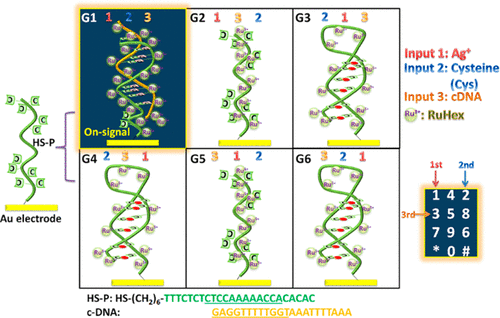Our official English website, www.x-mol.net, welcomes your feedback! (Note: you will need to create a separate account there.)
Smart Sensing Based on DNA–Metal Interaction Enables a Label-Free and Resettable Security Model of Electrochemical Molecular Keypad Lock
ACS Sensors ( IF 8.9 ) Pub Date : 2017-12-19 00:00:00 , DOI: 10.1021/acssensors.7b00735 Yan Du 1 , Xu Han 2 , Chenxu Wang 3 , Yunhui Li 2 , Bingling Li 1 , Hongwei Duan 3
ACS Sensors ( IF 8.9 ) Pub Date : 2017-12-19 00:00:00 , DOI: 10.1021/acssensors.7b00735 Yan Du 1 , Xu Han 2 , Chenxu Wang 3 , Yunhui Li 2 , Bingling Li 1 , Hongwei Duan 3
Affiliation

|
Recently, molecular keypad locks have received increasing attention. As a new subgroup of smart biosensors, they show great potential for protecting information as a molecular security data processor, rather than merely molecular recognition and quantitation. Herein, label-free electrochemically transduced Ag+ and cysteine (Cys) sensors were developed. A molecular keypad lock model with reset function was successfully realized based on the balanced interaction of metal ion with its nucleic acid and chemical ligands. The correct input of “1-2-3” (i.e., “Ag+-Cys-cDNA”) is the only password of such molecular keypad lock. Moreover, the resetting process of either correct or wrong input order could be easily made by Cys, buffer, and DI water treatment. Therefore, our system provides an even smarter system of molecular keypad lock, which could inhibit illegal access of unauthorized users, holding great promise in information protection at the molecular level.
中文翻译:

基于DNA-金属相互作用的智能感应可实现无标签且可重置的电化学分子键盘锁安全模型
近来,分子键盘锁已受到越来越多的关注。作为智能生物传感器的一个新的子类别,它们显示出巨大的潜力来保护信息作为分子安全数据处理器,而不仅仅是分子识别和定量。在此,开发了无标记的电化学转导的Ag +和半胱氨酸(Cys)传感器。基于金属离子与其核酸和化学配体的平衡相互作用,成功实现了具有复位功能的分子键盘锁模型。正确输入“ 1-2-3”(即“ Ag +-Cys-cDNA”)是这种分子键盘锁的唯一密码。此外,可以通过Cys,缓冲液和去离子水处理轻松地进行正确或错误输入顺序的重置过程。因此,我们的系统提供了一个更加智能的分子键盘锁系统,可以防止未经授权的用户非法访问,在分子层面的信息保护方面具有广阔的前景。
更新日期:2017-12-19
中文翻译:

基于DNA-金属相互作用的智能感应可实现无标签且可重置的电化学分子键盘锁安全模型
近来,分子键盘锁已受到越来越多的关注。作为智能生物传感器的一个新的子类别,它们显示出巨大的潜力来保护信息作为分子安全数据处理器,而不仅仅是分子识别和定量。在此,开发了无标记的电化学转导的Ag +和半胱氨酸(Cys)传感器。基于金属离子与其核酸和化学配体的平衡相互作用,成功实现了具有复位功能的分子键盘锁模型。正确输入“ 1-2-3”(即“ Ag +-Cys-cDNA”)是这种分子键盘锁的唯一密码。此外,可以通过Cys,缓冲液和去离子水处理轻松地进行正确或错误输入顺序的重置过程。因此,我们的系统提供了一个更加智能的分子键盘锁系统,可以防止未经授权的用户非法访问,在分子层面的信息保护方面具有广阔的前景。



























 京公网安备 11010802027423号
京公网安备 11010802027423号